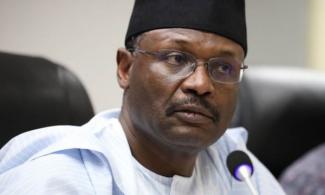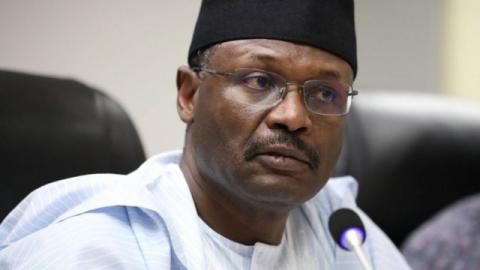
The position of the body was made known by the National Commissioner and Chairman, Information and Voter Education, Festus Okoye, while speaking on Tuesday at a programme organised by the National Endowment for Democracy (NED) titled, ‘Nigeria 2023: The New Electoral Act and the Road Ahead".
The Independent National Electoral Commission (INEC) says the major challenge to the electoral process in Nigeria is the insecurity ravaging some parts of the country.
The position of the body was made known by the National Commissioner and Chairman, Information and Voter Education, Festus Okoye, while speaking on Tuesday at a programme organised by the National Endowment for Democracy (NED) titled, ‘Nigeria 2023: The New Electoral Act and the Road Ahead".

According to him, insecurity has made it impossible for the Commission to deploy workers to some regions of the country and get people even at the Internally Displaced Persons (IDPs) camp registered.
He, however, said the commission was working gradually on curbing the menace via interactions under the Inter-agency Consultative Committee On Election Security, so as to allow for peaceful elections in 2023.
He said, “The biggest challenge facing the electoral process in Nigeria today revolves around the issue of election security.
“The Nigerian military is engaged in internal security operations in almost all the states of the federation. There are states of the federation where the commission cannot even deploy for purposes of voter registration and we have many people in IDP camps that have to be registered.
“All these things impact on the electoral process but under the auspices of the inter-agency consultative committee on election security, we are reviewing some of these things and trying to find some measures to the security challenges to make for peaceful elections.”
Okoye, who explained that the body had improved on the electoral process with the adoption of technology, however, called upon the international community to support the commission in the area of voter education and engage more robustly with the political parties.
He explained, “We have the INEC Candidate Nomination Form, before now, political parties conduct their primaries and come physically to submit particulars of their candidates, now we no longer have any physical interaction with them.
“They have to upload everything through the Candidate Nomination Form. We do the same thing for civil society groups, media and political party agents. We realised that the more you deploy technology, the more you need to create platforms to deploy the technology being deployed so we are also looking at our cyber security platforms and ensure we protect them as much as possible.
“We want the international community to continue to support the technology devices so that we can continue to improve in the use of technology. We also want the international community to partner with CSOs and the commission in the area of voter education and electoral education.
“We also want the international community to engage more robustly with the political party to guarantee peaceful and transparent elections.”